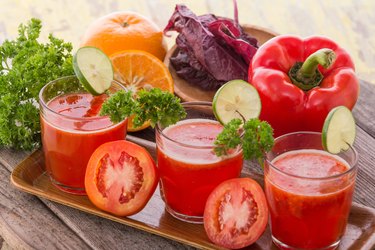
Vitamin K helps your blood clot properly. You get vitamin K from green, leafy vegetables such as spinach and kale. But bacteria in your small intestines also make vitamin K, so deficiencies are rare. Because vitamin K helps blood clot, it can counteract the effect of blood-thinning medications such as warfarin. If you're taking warfarin or another blood thinner, your doctor may advise you to avoid foods that are high in vitamin K, including the vegetable juice, V8.
V8
Video of the Day
V8 is a vegetable juice cocktail made of tomatoes, beets, celery, carrots, lettuce, parsley, watercress and spinach. One 4 oz. serving of juice equals one serving of vegetables. In addition to Vitamin K, original V8 juice provides vitamins A and C, potassium, folate and lycopene. The juice is low in fat and calories, though some versions are high in sodium. The juice contains about 1 g of fiber per half cup serving, much less than you'd get by eating the vegetables it contains.
Video of the Day
Vitamin K in V8
The government does not require food companies to list the amounts of vitamin K in foods in the nutrition information on the label, so V8's label doesn't provide this information. The Vitamin K registry online lists vegetable juice cocktail as a food that contains moderate amounts of vitamin K. They define moderate as 10 to 24 mcg per 1/2 cup serving. Upper Chesapeake Health's anticoagulation management team lists V8 juice as a "vitamin K rich beverage."
Vitamin K and Warfarin
Warfarin works by reducing the amount of vitamin K in your system, thus reducing the tendency of your blood to clot. It's an important medication in controlling blood clots that can cause strokes. When your doctor prescribed warfarin, she'll also ask that you come in for regular blood tests. These blood tests determine your INR, which is a measurement of the time it takes for your blood to clot. A high INR could lead to serious blood loss from even a minor injury, while a low INR could increase your risk of stroke. So getting the right dose of warfarin is a balancing act. Increasing the vitamin K in your diet alters your INR and can make accurate dosing more difficult.
Should You Drink V8?
According to Upper Chesapeake Health's anticoagulation management team, maintaining a consistent level of vitamin K consumption is more important than avoiding the vitamin altogether. If you routinely start your day with a glass of V8, this will be reflected in the vitamin K level in your bloodstream and your doctor will adjust your dosage of warfarin accordingly. If you decide on your own to avoid all vitamin K foods like V8, this will throw off your medication dosage. Likewise, if after years of abstinence you develop a fondness for V8, you need to alert your doctor so he can adjust your medication.